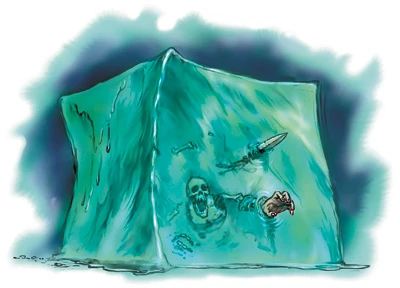For Sunday, another column I wrote for SciPhi Journal, with apologies to Bertrand Russell
The eminent antitheist and essayist Dr. Brussels dreamed that he died and found himself, against all expectation, at a pair of immense gates that shone like great pearls. He was shocked and rather apprehensive as he was met by a being that looked astonishingly human, like a king, with wings twice as long as he was tall.
“I see that I must be ill and hallucinating, or having an end-of-life experience,” he said. “For nothing else could explain the anthropomorphic delusion I am currently suffering.”
“You are not ill, but you are having an ‘end-of-life experience,’ said the being. “It is called Heaven.”
“Heaven could hardly exist,” Brussels replied, “And if it did, it certainly would not look at all like a mere Human conception.”
The being smiled. “Heaven can look as It pleases, though Its reality is indeed far deeper than any one species of the Creation could fathom, at least at first. You are expected.”
“But how could I be expected in Heaven?”
“That is hardly for me to judge, man,” said the being. “I am to take you to the Eternal.” And in no very long time, he was led through the glories of the Celestial City, where, to his great surprise, Brussels found himself standing in the Presence.
“My child,” said The Eternal. “You have come at last.”
“You cannot possibly judge me. Amid all the planets of all the stars of all the galaxies of the Universe, how could you possibly know who I am, let alone presume to judge my motivations, my circumstances, and my actions?”
“My dear child,” said The Eternal. “No one has yet mentioned judgment. But you devoted your life to the study of the Universe. How is it that you do not understand what “infinite” means? How could I possibly not know all about you? Is My time limited?”
“Of course I know what ‘infinite’ means,” said Dr. Brussels. “But I can hardly be expected to have spent much time upon speculation about Your attributes. My study was the facts of the Universe that were proven, and not about Your existence, which was entirely unproven.”
The Eternal replied, “And did your studies not teach you that the Universe I created had a beginning and was likely to have an end? And surely you learned that your own life had a beginning and an end: that was much more provable. You believed that because of your small size and short life, I could not possibly take any interest in you, and yet you devoted that almost nonexistent life to the study of the lifespan of a Thing that was also limited, but merely much larger. Did you think this a wise use of the time I had granted you?”
“Well,” he sputtered, “But You did not give me adequate proof of Your existence to make me think that studying You was likely to be of value.”
“I see,” smiled the Eternal. “And the fact that the vast majority of your fellow-humans spent a great deal of time on that very endeavor suggested nothing to you?”
“It suggested only that the ignorant love ignorance, for surely even You must agree that humans agree to believe things that are manifestly untrue,” Dr. Brussels riposted.
“Of course, child. You are correct. Tell Me, what sort of evidence would you have found acceptable?”
Feeling a little surer of himself, Dr. Brussels replied, “Any sort of physical evidence of your existence.”
“So you wanted Me, a Being larger than the Universe, to appear inside it?”
“Ah, but surely You could have made Yourself smaller, if You were indeed Infinitely capable.”
“So you believe I could have made myself small enough for you to perceive, but not that I could have paid attention to you? I could indeed have done so, and have,” replied the Eternal. “But then would you not have said that my small size proved Me an impostor?”
“Well,” said Dr. Brussels, “But You could have demonstrated Your power.”
“So, I might have come to Earth, perhaps disguised as a Human, and done miraculous works?” smiled the Infinite. “Or as a pillar of smoke and flame? If only there were records of such an event available for a learned man such as yourself to peruse.”
Dr. Brussels felt himself blushing at the trap he had nearly fallen into. “Records are hardly any use to a scientist concerned with truth!” he stated. “Only that which has been proven is acceptable.”
“I see. Then surely you, Dr. Brussels, performed every experiment of Ptolemy, Copernicus, Galileo, Newton, and Einstein, not to mention others we could both name, simply to make sure they were true. I am surprised, however, that you ever had time for anything else.”
“Of course I trusted the testimony of the great experts in my field,” Dr. Brussels said.
“But you did not trust the testimony of Albertus Magnus and Paracelsus?”
“Of course not. Their methodology was flawed and their results untrustworthy.”
“Ah. So the lived experience of scientists about science was trustworthy, even to the extent of trusting them to point out the flaws of less capable scientists. But you could not trust the writings of theologians about theology because you had not shared their experiences directly, and they disagreed with one another.”
“But why,” asked Dr. Brussels, “could You not simply be with us all the time?”
“I believe you would have discovered that the answer to that question in the records to which I earlier referred. I withdrew because humans did not want My company as much as they wanted to discover truth in their own way, regardless of how harmful that could be, both to themselves and others. And now that I have withdrawn, humans ask where I Am. What would you have Me do, child?”
“You could at least, if you are so powerful, present Yourself to those who are honest and would be amenable to reason individually, so that they might have a chance of knowing you!” snapped Dr. Brussels.
“Of course, I could, child,” replied the Infinite. “And it would need to be personal, direct, and in a similar manner, so that those enlightened men you describe would know that it was from Me, and would have cause to humble themselves, and follow.”
“Yes!” cried Brussels. “So why don’t you do that?”
And he awoke in his home.
“Strange, the delusions that will overtake even the most serious and scientific minds,” he muttered.

